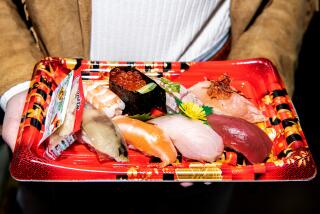Better Taste to Beef, Oranges
- Share via
Japanese consumers at long last can look forward to some relief from the staggering costs that they have been forced to bear because of their government’s protectionist farm policies. After years of on-and-off negotiations that were always hard and sometimes bitter, Tokyo and Washington have agreed on a formula to increase sales of American beef, oranges and orange juice in Japan. The phasing out of quotas on these products over the next three to four years can only work to push down their current sky-high retail prices. At the same time, American farmers--particularly cattle raisers--can anticipate an expansion of their markets in Japan worth perhaps billions of dollars.
The quotas and tariffs imposed on the U.S. imports have been a classic case of political favoritism subsidized through higher consumer prices. The conservative Liberal Democratic Party, which has dominated postwar political life in Japan, has always counted heavily on support from farmers and has always taken care to reward their loyalty. Nearly half the LDP members now sitting in the Diet represent districts where agricultural interests are important. Included are hundreds of thousands of households that engage in raising cattle, usually on a very small scale.
To assure these farmers high prices--top-quality steak now sells for up to $54 a pound in Tokyo--a government agency has retained a monopoly over foreign beef purchases, stringently limiting imports of the better cuts. That agency will now be phased out along with the quotas. Though the tariff on imported beef will be raised to ease the transition for Japanese cattle raisers, retail prices nonetheless are expected to fall.
The agreement on beef and oranges ends a wearying chapter in U.S.-Japan trade relations. While other trade disputes remain to be fought over in the months and years ahead, the new understanding clearly is an important symbolic step. After less than a year in office, Prime Minister Noburo Takeshita has done what his predecessor was unable or unwilling to do during his five-year tenure. This agreement won’t by itself do much to reduce the U.S. trade deficit with Japan, but it could do a lot to improve the political climate.
More to Read
Sign up for Essential California
The most important California stories and recommendations in your inbox every morning.
You may occasionally receive promotional content from the Los Angeles Times.













